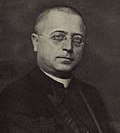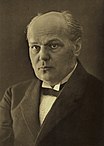1920 Czechoslovak parliamentary election: Difference between revisions
ThecentreCZ (talk | contribs) No edit summary |
ThecentreCZ (talk | contribs) No edit summary |
||
| Line 124: | Line 124: | ||
| leader7 = [[Hans Knirsch]] |
| leader7 = [[Hans Knirsch]] |
||
| party7 = German National Socialist Workers' Party |
| party7 = German National Socialist Workers' Party |
||
| alliance7 = <small>[[German National Socialist Workers' Party (Czechoslovakia)|DNSAP]]–[[German National Party|DNP]]</small> |
|||
| alliance7 = |
|||
| leader_since7 = |
| leader_since7 = |
||
| leaders_seat7 = |
| leaders_seat7 = |
||
Revision as of 19:24, 29 December 2017
| |||||||||||||||||||||||||||||||||||||||||||||||||||||||||||||||||||||||||||||||||||||||||||||||||||||||||||||
All 300 seats to the Chamber of Deputies All 150 seats to the Senate 151 seats needed for a majority | |||||||||||||||||||||||||||||||||||||||||||||||||||||||||||||||||||||||||||||||||||||||||||||||||||||||||||||
|---|---|---|---|---|---|---|---|---|---|---|---|---|---|---|---|---|---|---|---|---|---|---|---|---|---|---|---|---|---|---|---|---|---|---|---|---|---|---|---|---|---|---|---|---|---|---|---|---|---|---|---|---|---|---|---|---|---|---|---|---|---|---|---|---|---|---|---|---|---|---|---|---|---|---|---|---|---|---|---|---|---|---|---|---|---|---|---|---|---|---|---|---|---|---|---|---|---|---|---|---|---|---|---|---|---|---|---|---|---|
| Turnout | 89.6% & 75.6% | ||||||||||||||||||||||||||||||||||||||||||||||||||||||||||||||||||||||||||||||||||||||||||||||||||||||||||||
| |||||||||||||||||||||||||||||||||||||||||||||||||||||||||||||||||||||||||||||||||||||||||||||||||||||||||||||
| |||||||||||||||||||||||||||||||||||||||||||||||||||||||||||||||||||||||||||||||||||||||||||||||||||||||||||||
 |
|---|
| Administrative divisions |
Parliamentary elections were held in Czechoslovakia on 18 and 25 April 1920.[1] Voting for the Chamber of Deputies occurred on April 18, 1920, and the voting for the Senate was held a week later on April 25, 1920.[2] The election had initially been planned for mid- or late 1919, but had been postponed.[3]
Out of the 300 Chamber of Deputies seats 281 were filled, as no elections were held in Hlučín Region (part of the Moravská Ostrava electoral district, resulting in 1 less deputy elected from that district), the Těšín electoral district (9 deputies) and the Užhorod electoral district (9 deputies).[4][5][6][7] 16 parties won parliamentary representation.[8] Voter turnout was 89.6% for the Chamber election and 75.6% for the Senate.[9]
The Czechoslovak Social Democratic Workers' Party (ČSDSD) emerged as the largest party in the 1920 election, with 25.7% of the vote for the Chamber of Deputies, 74 deputies elected, 28.1% of the vote for the Senate and 41 senators elected.[2] Amongst the Czech voters, the 1920 election outcome was marked by remarkable stability compared to the 1911 election.[10] The gap between Czech socialist and bourgeouis parties had only moved by 0.4% compared to the 1911 result.[10]
Results
Chamber of Deputies
| Party | Nationality | Votes | % | Seats | |
|---|---|---|---|---|---|
| bgcolor="Template:Czech Social Democratic Party/meta/color"| | Czechoslovak Social Democratic Workers' Party | Czechoslovak | 1,590,520 | 25.65 | 74 |
| Czechoslovak People's Party | Czechoslovak | 699,728 | 11.29 | 33 | |
| German Social Democratic Workers' Party | German | 689,589 | 11.12 | 31 | |
| Republican Party of Farmers and Peasants | Czechoslovak | 603,618 | 9.74 | 28 | |
| bgcolor="Template:Czech National Social Party/meta/color"| | Czechoslovak Socialist Party | Czechoslovak | 500,821 | 8.08 | 24 |
| Czechoslovak National Democracy | Czechoslovak | 387,552 | 6.25 | 19 | |
| bgcolor="Template:German National Socialist Workers' Party/meta/color"| | German National Socialist Workers' Party | German | 328,735 | 5.30 | 15 |
| bgcolor="Template:Slovak National and Peasant Party/meta/color"| | Slovak National and Peasant Party | Slovak | 242,045 | 3.91 | 12 |
| Farmers' League | German | 241,747 | 3.90 | 11 | |
| German Christian Social People's Party | German | 212,913 | 3.43 | 10 | |
| Provincial Christian-Socialist Party | Hungarian | 139,355 | 2.25 | 5 | |
| bgcolor="Template:Czechoslovak Traders' Party/meta/color"| | Czechoslovak Traders' Party | Czechoslovak | 122,813 | 1.98 | 6 |
| Hungarian-German Social Democratic Party | Hungarian | 108,546 | 1.75 | 4 | |
| German Liberal Party | German | 105,449 | 1.70 | 5 | |
| United Jewish Parties | Jewish | 79,714 | 1.29 | 0 | |
| Socialist Party of the Czechoslovak Working People | Czechoslovak | 58,580 | 0.94 | 3 | |
| Party of Smallholders, Cottiers and Entrepreneurs of Czechoslovakia | Czechoslovak | 42,670 | 0.69 | 0 | |
| Hungarian Provincial Party of Smallholders and Agrarians | Hungarian | 26,520 | 0.43 | 1 | |
| German Free Social Party | German | 7,630 | 0.12 | 0 | |
| Independent Party of Small People | Czechoslovak | 5,252 | 0.08 | 0 | |
| Hungarian National Party | Hungarian | 4,214 | 0.07 | 0 | |
| Slavic Socialist Party | Czechoslovak | 2,024 | 0.03 | 0 | |
| Total | 6,200,035 | 100 | 281 | ||
Senate
| Party | Votes | % | Seats |
|---|---|---|---|
| Czechoslovak Social Democratic Workers' Party | 1,466,958 | 28.07 | 41 |
| Czechoslovak People's Party | 622,406 | 11.91 | 18 |
| German Social Democratic Workers' Party | 539,344 | 11.35 | 16 |
| Republican Party of Farmers and Peasants | 530,388 | 10.15 | 14 |
| Czechoslovak Socialist Party | 395,844 | 7.57 | 10 |
| Czechoslovak National Democracy | 354,561 | 6.78 | 10 |
| German National Socialist Workers' Party | 300,333 | 5.7 | 8 |
| Farmers' League | 210,724 | 4.0 | 6 |
| Slovak National and Peasant Party | 181,289 | 3.47 | 6 |
| German Christian Social People's Party | 141,495 | 2.7 | 4 |
| Czechoslovak Traders' Party | 107,674 | 2.06 | 3 |
| Provincial Christian-Socialist Party | 100,371 | 1.92 | 2 |
| Other parties | 275,424 | 5.30 | 4 |
| Total | 5,226,811 | 100 | 142 |
| Source: Nohlen & Stöver | |||
References
- ^ Nohlen, D & Stöver, P (2010) Elections in Europe: A data handbook, p471 ISBN 978-3-8329-5609-7
- ^ a b Richard Crampton; Benjamin Crampton (11 June 2016). Atlas of Eastern Europe in the Twentieth Century. Routledge. pp. 58–60. ISBN 978-1-317-79952-8.
- ^ Duin, P.C. van. Central European Cross-roads: Social Democracy and National Revolution in Bratislava (Pressburg), 1867-1921
- ^ Jahrbuch des öffentlichen Rechts der Gegenwart. Vol. 17–18. J. C. B. Mohr (P. Siebeck). 1929. p. 241.
- ^ Otto Bauer (1926). Der Kampf: sozialdemokratische Monatsschrift. Vol. 19. Verlag Volksbuchhandlung. p. 12.
- ^ "Volkswohl"; wissenschaftliche Monatsschrift. Vol. 11–12. 1920. p. 205.
- ^ Mads Ole Balling (1991). Von Reval bis Bukarest: Einleitung, Systematik, Quellen und Methoden, Estland, Lettland, Litauen, Polen, Tschechoslowakei. Dokumentation Verlag. p. 417. ISBN 978-87-983829-3-5.
- ^ Joseph Lee (1989). Ireland, 1912-1985: Politics and Society. Cambridge University Press. p. 80. ISBN 978-0-521-37741-6.
- ^ Nohlen & Stöver, p472
- ^ a b Carol Skalnik Leff (14 July 2014). National Conflict in Czechoslovakia: The Making and Remaking of a State, 1918-1987. Princeton University Press. pp. 48–49, 67. ISBN 978-1-4008-5921-4.









